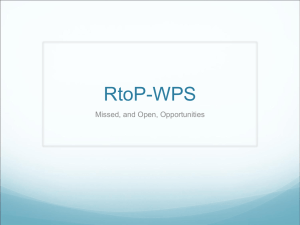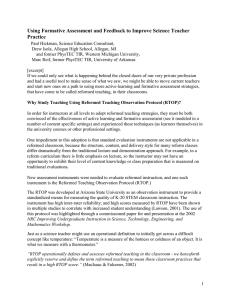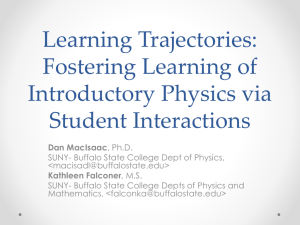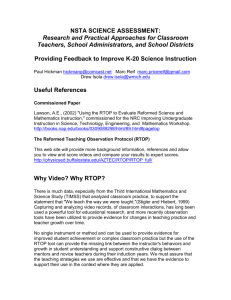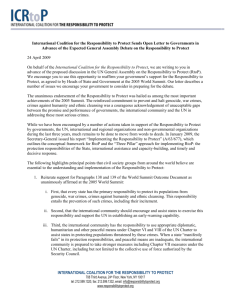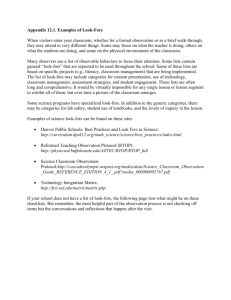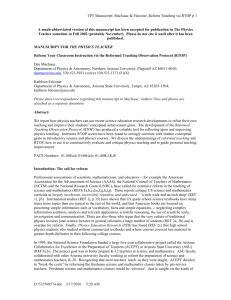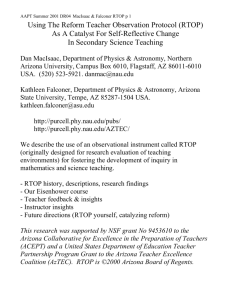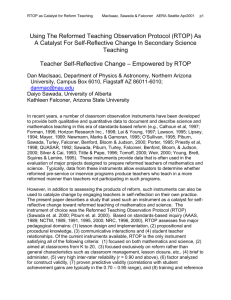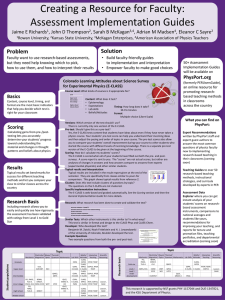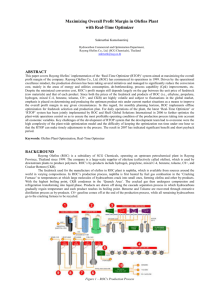Using RTOP slides
advertisement
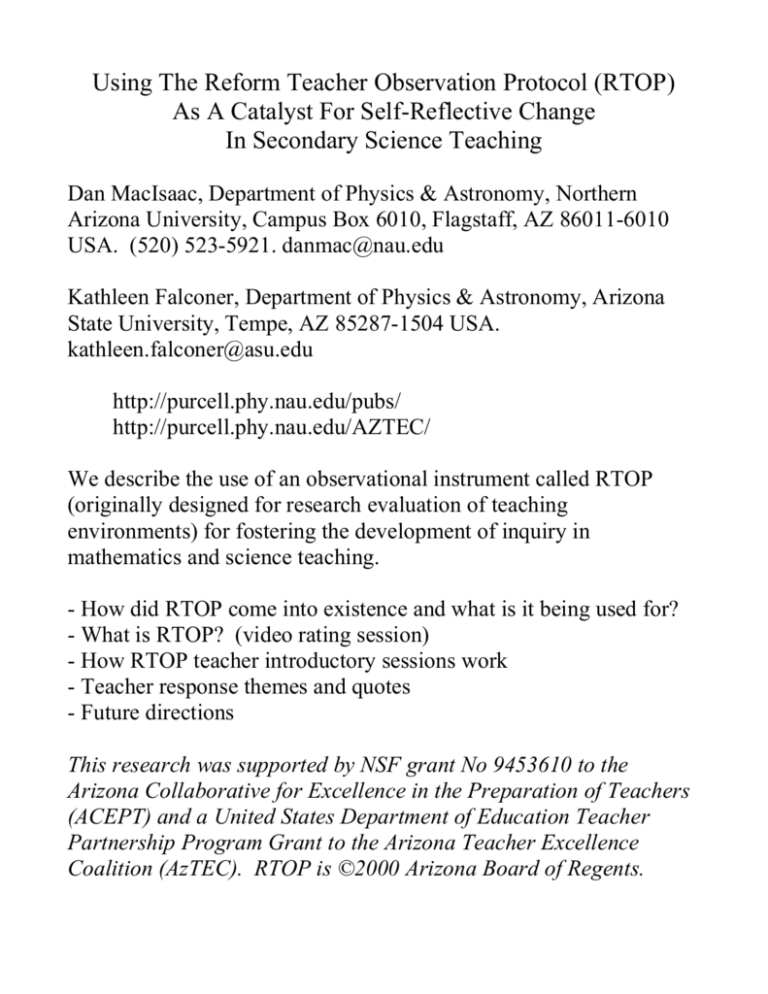
Using The Reform Teacher Observation Protocol (RTOP) As A Catalyst For Self-Reflective Change In Secondary Science Teaching Dan MacIsaac, Department of Physics & Astronomy, Northern Arizona University, Campus Box 6010, Flagstaff, AZ 86011-6010 USA. (520) 523-5921. danmac@nau.edu Kathleen Falconer, Department of Physics & Astronomy, Arizona State University, Tempe, AZ 85287-1504 USA. kathleen.falconer@asu.edu http://purcell.phy.nau.edu/pubs/ http://purcell.phy.nau.edu/AZTEC/ We describe the use of an observational instrument called RTOP (originally designed for research evaluation of teaching environments) for fostering the development of inquiry in mathematics and science teaching. - How did RTOP come into existence and what is it being used for? - What is RTOP? (video rating session) - How RTOP teacher introductory sessions work - Teacher response themes and quotes - Future directions This research was supported by NSF grant No 9453610 to the Arizona Collaborative for Excellence in the Preparation of Teachers (ACEPT) and a United States Department of Education Teacher Partnership Program Grant to the Arizona Teacher Excellence Coalition (AzTEC). RTOP is ©2000 Arizona Board of Regents. RTOP Historical Background: developed for ACEPT ($5M / 5yr NSF CETP) CETPs were College of Science + College of Ed; break cycle CETP-wide instrument adapted from Horizons instrument fast (1hr); in-and-out observation Science and Math ASU team + Sawada & Piburn constructivism, discourse, standards. inquiry adopted by AzTEC ($13.8M / 5yr DoEd Tchr Partnership) recruit, better prepare, induct and retain SMET tchrs NAU ASU UofAz university faculties (tchr subject instr, methods) 'feeder' community colleges (recruiting, instr) school districts (recruiting, induction) economic zones (recruiting) NAU / FUSD BIO100, ENV101, PHY111/112, PHS101, MAT this yr revised sec sci ed methods courses (24 students/date) 1999 Eisenhower course NAU (31 tchrs; 8+2 FUSD) evaluation and catalyst for 118 FUSD mentoring tchrs used to operationally define inquiry teaching for teachers Presentations: AERA & NARST 2001 (even some AETS!) The Instrument: 'Reform' Teacher Observation Protocol 'Reform' operationally defined as a high RTOP score! Connect & background + 25 items Lesson design and implementation Content propositional knowledge Content procedural knowledge Class Culture student inter/intra Class Culture student/teacher (0-4)pts x 5 (0-4)pts x 5 (0-4)pts x 5 (0-4)pts x 5 (0-4)pts x 5 Sample scores: Highly traditional Univ sci / math lecture Traditional HS direct instruction Presenter's personal best (125+ students) Best recorded (25 students, modeling) 15-30pts 25-35pts 73pts 100pts RTOP Teacher Introduction Sessions - history of instrument; why we care - show and RTOP 'seductive' video; call out scores - form small groups by score variation, discuss and debate - show and RTOP modeling physics video - large group discussion - give all whiteboards; send off to teaching & mentoring - listserv reporting Teacher Feedback at end of Fall 2000 semester (n = 35 / 118) Teachers asked to comment on whiteboards, RTOP and mentoring. RTOP-only themes by occurrence: - did not change teaching; validated my ideas about teaching (EEI) - reinforced import of 'student talk' - reinforced import of 'student-centered activities' - strong tool for reflection on teaching - some lessons much harder than others to adapt to reform - need to spend much more time on material - RTOP observations are stressful - want to spend more time learning about RTOP (Math people) - no idea what RTOP is really about (session attendence) - used RTOP for self-analysis of lessons (planning, debrief) Other notables: - gives examples of change - provides common vocabulary for teacher interactions - students liked RTOP lessons more/less - more open to trying new ideas in other teacher resources I cannot say that RTOP has affected my teaching greatly other than becoming aware of letting the students be more vocal in how they perceive the results or what they see is happening during experiments. The instrument itself is valuable in helping teachers focus on improving their lessons. It reminds the instructor of ways of approaching teaching that aren't traditionally assessed. Yes, I have attended a RTOP session, and it confirmed that the concepts and the problem-solving processes vs. algorithim learning should be the focus. Algorithims have their place, but students need to understand the concepts and processes behind them. Students seeing problems being solved in different ways opens up their thinking, allowing them to make connections that they might not of made otherwise. I think RTOP validates a lot of the things that I have been trying to do in my classroom and with my teaching and I look for ward to being evaluated to see where I am at. I am not clear on when and how we will be evaluated using RTOP and am a little bit concerned that some lessons are very naturally set up to fit the model well, while others types of lessons may not fit the concept at all. I am under the impression that the evaluation will be a drop in kind of thing and it seems that might not be very representative if it is only d one a couple of times. I do understand that evaluation here does not have a negative effect on my job and is intended to give me an idea of where I am so these are only concerns in general and not real worries. …have expressed concern that they are not sure that the amount of time and effort (and the added stress of being observed by you and me) is worth the stipend. In addition, they are questioning how RTOP is any different from what we know as good primary learning where children are actively involved in hands-on activities. However, I did do a couple of labs this past semester in a different way than I have previously. We did the % water in a hydrate lab in a more “exploratory” fashion. Rather than having students do the lab “cookbook” fashion, we brainstormed some ideas as a class, and then student groups wrote their procedures and data on a whiteboard. In general, this approach worked much better than simply having students follow the procedure. For one thing, they liked the lab much better than did students in previous semesters (it’s really a pretty boring lab, especially when compared with others we do). It also allowed me to do “less” with each lab, conceptually. I’ve found that most students really don’t get the calculations of % water and determining the value of “n” for the hydrate. Doing two separate labs, and having students discuss the procedure helped more (but not all) of my students to understand the calculations involved. It also took four days (rather than 1 – 1.5 days). That wasn’t the end of the world, but it certainly is a factor to be considered. I see RTOP as a tool that can be used to help educators develop and grow. It can help new teachers build a strong foundation and veteran teachers modify and enhance their classroom skills. As with any evaluation tool, it can be used in both positive and negative ways. Care should be taken to ensure that it is used to build on an individual's strenghts and not as a way to bring someone down. I always try to bear in mind the RTOP questionnaire during my lessons. I have one lesson that is very involved with students graphing lab data in order to arrive at a quadratic relationship. I have developed this lab, with the help of Kathleen Falconer, so that the lesson is not so much simply copying analysis from the board but rather developing their own graphs in order to discover the quadratic relationship between the variables. This lesson is a guided lab in which the students will direct the outcome. It is a result of looking at a tried lab and comparing it to the RTOP procedures. The strengths of RTOP include its use as a guide for analysis of lessons. It demands that students develop an operational understanding of the content material through self-direction. A weakness is that it is difficult to judge when the Socratic questioning or lack of thorough instructions may bring students to a point of frustration that may inhibit further learning. It has been very difficult to RTOP many math lessons. I feel that I have had adequate training in creating and adapting existing assignments to the RTOP format. One of the most limiting parameters is the lack of time to devote to teaching more RTOP lessons. We have so much material which needs to be covered in order for the students to be prepared for standardized testing and the next math class. The students enjoy the RTOP style lessons but they work so much slower at discovering concepts. I have packaged and repackaged concepts in order to get them all covered before the end of the term. Unfortunately, math concepts can not be skipped nor ignored if students are to be adequately prepared. CHALLENGING: Its downfall, however, is that it is very subjective. How does one define "patience"? What does it look like? When evaluating this item, does the evaluator know the background with a given student and why patience may or may not have been shown? This is true for many other items as well. In using the RTOP, I believe it is imperative for the evaluator to have some background knowledge of the students in question.
